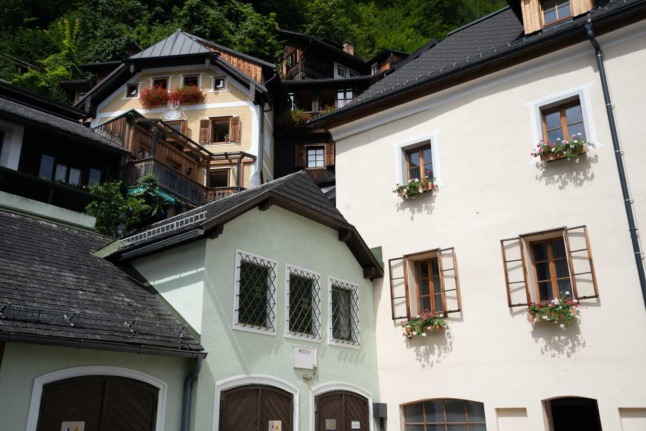What is the best way to invest your money in Austria?

It’s no secret that the cost of living is high in Austria, but if you do have some spare cash, should you invest? And if so, how? We spoke to two financial experts to find out more about investing in Austria as an international resident.
With interest rates rising and inflation remaining stubbornly high in Austria, many people are wondering what to do with their money – especially when it comes to their future financial security.
But the problem becomes even more complex for foreigners, particularly if they have assets in different countries.
We spoke to two financial experts to find out more about investing in Austria as an international resident.
READ ALSO: Can owners of second homes in Austria get residence permits?
Assets, local laws, and rate rises
Tom Goold, a financial advisor at Valiant Wealth, told The Local that Austria is currently growing as a market for financial advice for expats.
Goold said: “This is largely due to local financial services providers not fully understanding the needs of an international person or being able to offer tailored advice. In our experience, local advice tends to be quite ‘one-size-fits-all’ with a focus on their local assets.
“As an international resident is likely to have assets outside of Austria – whether that be personal investments, insurance-based products, property or pensions – it is imperative that they seek financial planning that considers how these are treated in Austria.”
Furthermore, changes in circumstances, especially for British people since Brexit, have led to an increase in enquiries for help with investments.
Goold explained: “We have been approached by expats in Austria looking for help with their international pensions – especially British expats with UK pensions – as well as professionals who may have been sold a product in another country only to find out it is not suitable in Austria and liable to more punitive taxation.”
READ MORE: EXPLAINED: How does the Austrian pension system work?
Meanwhile, Grzegorz Drozdz, a market analyst at Conotoxia, told The Local that when it comes to investing in Austria, each situation is different and recommendations depend on the age of the investor, risk tolerance, or the wealth of an existing portfolio.
As a result, there is no set investment strategy that works for everyone - but options can include currencies, stocks, or bonds.
Drozdz said: “Sometimes even a loan can turn out to be a beneficial investment, as long as it is used, for example, for the development of professional skills or the purchase of real estate. In the latter case, however, it is important to realize that credit currently seems relatively expensive.
“This situation does not seem likely to change any time soon. After all, high and persistent inflation is prompting the European Central Bank to raise interest rates further.”
What about buying property in Austria?
Property is often touted as a ‘reliable’ investment, even in Austria, where less than 50 percent of the population own their own home, compared to around 70 percent across the EU.
However, the property market in Austria has been booming in recent years, which means many residents are currently priced out of the market – especially in tourist regions like Salzburg and Tyrol.

Buying property in Austria as a foreigner can be tricky - depending on where you are from. Photo by Datingscout on Unsplash
In fact, a recent article in Der Standard revealed that property prices in Austria rose by 116 percent between 2010 and 2022, while the median net salary for a full-time employee rose by only 32 percent during the same period.
FOR MEMBERS: Can I get a mortgage in Austria as a foreigner?
This means that while the value of a property is rising, buyers need a lot of cash to get on the ladder in the first place, as well as manage increasing mortgage rates.
When asked about whether property was a good investment for international residents in Austria right now, Drozdz said: “It does not appear that optimal conditions currently prevail for buying a house or apartment, especially with fixed interest rates."
“From the position of a foreigner considering the purchase of a property in a country where he or she is only temporarily staying, it also seems important to realize that maintaining and looking after it over time can prove troublesome,” he adds.
Investment tips for international residents
So how should foreigners in Austria approach their finances, especially when it comes to investments?
Goold, from Valiant Wealth, said: “The best path to follow for an international resident in Austria is to seek independent, transparent, fee-based advice from a properly regulated firm.
“They need to consider how their assets are treated in Austria and create a long-term plan suitable to achieve their goals.”
Meanwhile, Drozdz from Conotoxia said: “The general rule in investment is not to put everything on one card, leaning rather towards diversification, such as diversifying the so-called investor portfolio.”
READ MORE: EXPLAINED: The main Austrian 'tax traps' foreigners should be aware of
Tax is another consideration when making a financial plan and considering investments. Although, according to Goold at Valiant Wealth, taxes and investments should be dealt with separately.
Goold added: “In our view, it is important to separate tax and financial advice to avoid a conflict of interest. We have witnessed financial advisors giving advice based on tax reasons that clearly benefit them, such as transferring a UK pension to Malta.
“We always ensure that our clients are given the opportunity to access tax advice separately. Aside from the fact that no one is qualified to give both tax and financial advice, working in this way ensures the client has the most robust solution.”
Comments
See Also
With interest rates rising and inflation remaining stubbornly high in Austria, many people are wondering what to do with their money – especially when it comes to their future financial security.
But the problem becomes even more complex for foreigners, particularly if they have assets in different countries.
We spoke to two financial experts to find out more about investing in Austria as an international resident.
READ ALSO: Can owners of second homes in Austria get residence permits?
Assets, local laws, and rate rises
Tom Goold, a financial advisor at Valiant Wealth, told The Local that Austria is currently growing as a market for financial advice for expats.
Goold said: “This is largely due to local financial services providers not fully understanding the needs of an international person or being able to offer tailored advice. In our experience, local advice tends to be quite ‘one-size-fits-all’ with a focus on their local assets.
“As an international resident is likely to have assets outside of Austria – whether that be personal investments, insurance-based products, property or pensions – it is imperative that they seek financial planning that considers how these are treated in Austria.”
Furthermore, changes in circumstances, especially for British people since Brexit, have led to an increase in enquiries for help with investments.
Goold explained: “We have been approached by expats in Austria looking for help with their international pensions – especially British expats with UK pensions – as well as professionals who may have been sold a product in another country only to find out it is not suitable in Austria and liable to more punitive taxation.”
READ MORE: EXPLAINED: How does the Austrian pension system work?
Meanwhile, Grzegorz Drozdz, a market analyst at Conotoxia, told The Local that when it comes to investing in Austria, each situation is different and recommendations depend on the age of the investor, risk tolerance, or the wealth of an existing portfolio.
As a result, there is no set investment strategy that works for everyone - but options can include currencies, stocks, or bonds.
Drozdz said: “Sometimes even a loan can turn out to be a beneficial investment, as long as it is used, for example, for the development of professional skills or the purchase of real estate. In the latter case, however, it is important to realize that credit currently seems relatively expensive.
“This situation does not seem likely to change any time soon. After all, high and persistent inflation is prompting the European Central Bank to raise interest rates further.”
What about buying property in Austria?
Property is often touted as a ‘reliable’ investment, even in Austria, where less than 50 percent of the population own their own home, compared to around 70 percent across the EU.
However, the property market in Austria has been booming in recent years, which means many residents are currently priced out of the market – especially in tourist regions like Salzburg and Tyrol.

In fact, a recent article in Der Standard revealed that property prices in Austria rose by 116 percent between 2010 and 2022, while the median net salary for a full-time employee rose by only 32 percent during the same period.
FOR MEMBERS: Can I get a mortgage in Austria as a foreigner?
This means that while the value of a property is rising, buyers need a lot of cash to get on the ladder in the first place, as well as manage increasing mortgage rates.
When asked about whether property was a good investment for international residents in Austria right now, Drozdz said: “It does not appear that optimal conditions currently prevail for buying a house or apartment, especially with fixed interest rates."
“From the position of a foreigner considering the purchase of a property in a country where he or she is only temporarily staying, it also seems important to realize that maintaining and looking after it over time can prove troublesome,” he adds.
Investment tips for international residents
So how should foreigners in Austria approach their finances, especially when it comes to investments?
Goold, from Valiant Wealth, said: “The best path to follow for an international resident in Austria is to seek independent, transparent, fee-based advice from a properly regulated firm.
“They need to consider how their assets are treated in Austria and create a long-term plan suitable to achieve their goals.”
Meanwhile, Drozdz from Conotoxia said: “The general rule in investment is not to put everything on one card, leaning rather towards diversification, such as diversifying the so-called investor portfolio.”
READ MORE: EXPLAINED: The main Austrian 'tax traps' foreigners should be aware of
Tax is another consideration when making a financial plan and considering investments. Although, according to Goold at Valiant Wealth, taxes and investments should be dealt with separately.
Goold added: “In our view, it is important to separate tax and financial advice to avoid a conflict of interest. We have witnessed financial advisors giving advice based on tax reasons that clearly benefit them, such as transferring a UK pension to Malta.
“We always ensure that our clients are given the opportunity to access tax advice separately. Aside from the fact that no one is qualified to give both tax and financial advice, working in this way ensures the client has the most robust solution.”
Join the conversation in our comments section below. Share your own views and experience and if you have a question or suggestion for our journalists then email us at [email protected].
Please keep comments civil, constructive and on topic – and make sure to read our terms of use before getting involved.
Please log in here to leave a comment.